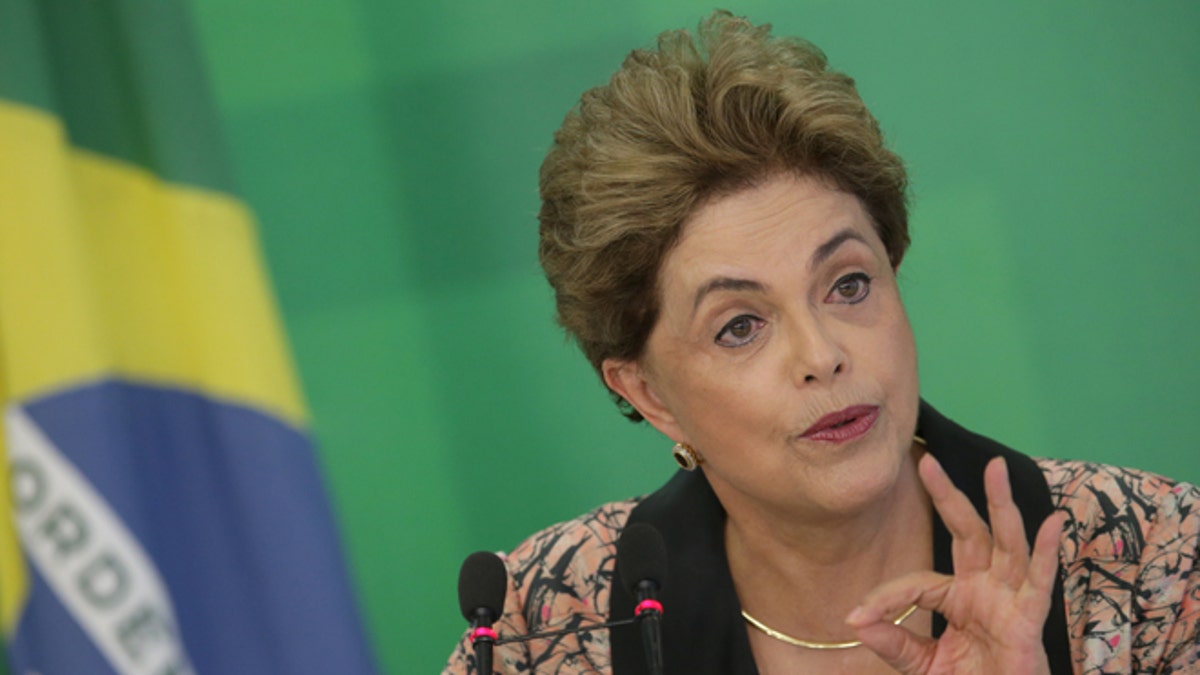
Rousseff during a press conference at the Planalto Presidential Palace in Brasilia, Tuesday, April 19, 2016. (ap)
With the Brazilian senate poised to vote President Dilma Rousseff out of office on Wednesday, the South American nation is teetering on the brink of political and economic collapse. But, experts say, there is little chance it will bleed far beyond the country itself.
The signs of instability are everywhere as the government – with people in positions of power in every branch under a cloud of suspicion because of the corruption scandal engulfing the state-owned petroleum giant, Petrobras.
Rousseff could become the country’s second president in less than 25 years to be impeached. Adding to the unrest in the country are an ongoing economic recession – with the country’s economy expected to shrink by 3.5 percent this year – the rapid spread of the Zika virus and the stress from the infrastructure and logistical nightmare that a major international event like the Rio de Janeiro Olympic Games in August can present.
“It’s no big deal in terms of the U.S.,” Arturo Porzecanski, an economist in residence at American University’s School of International Service, told Fox News Latino about the crisis in Brazil. “Nobody is worrying about an apocalyptic situation like the Libya scenario.”
Porzecanski referred to the events in the North African nation after the 2011 overthrow of Muammar Ghadafi, which left the country barely able to function as a state – a situation that still poses a major security threat to Europe.
While all this would appear to be a fair warning to U.S. and European businesses and investors to keep away from the BRIC nation, economists say that it’s unlikely to have lasting repercussions.
He added that instead of seeing Brazil’s current situation as a negative, Wall Street could look positively on the likely ouster of Rousseff.
Her interim replacement would be Vice President Michel Temer, who has indicated that he would pursue economic reforms and more business-friendly policies than Rousseff – who has generally had positive relations with the U.S., but has clashed occasionally with the Obama administration, most notably after the NSA spying scandal.
Experts within Brazil are also hopeful that the country can weather the current political storm and see a return of Brazil’s economic miracle of the early 2000s.
Antonio Delfim Netto, a former finance minister and long-time adviser to Brazil’s top politicians, told Bloomberg that he is confident that Temer can restore consumer and investor confidence and end the country’s longest recession.
"Temer is the only one who can save the [economy]," Delfim said. "There’s no major divergence among economists on what needs to be done."
Some of the things that Delfim pointed to include labor law reforms, changing the way pension payments are adjusted and making the country’s budget more flexible.
For now, though, Brazilians wait to see what Rousseff’s fate will be when the Senate takes up the matter of her impeachment on Wednesday.
The case against her focuses on how she allegedly broke fiscal rules in her management of the national budget.
Rousseff has said that prior presidents used such fiscal maneuvers without penalty and that the impeachment effort amounts to a "coup" aimed at removing her and the left-leaning Workers' Party, which has governed the country for 13 years, from power.
If a simple majority of the country's 81 senators decides in favor, Rousseff will be suspended and Temer will take over until a trial is conducted.
The Associated Press contributed this report.
